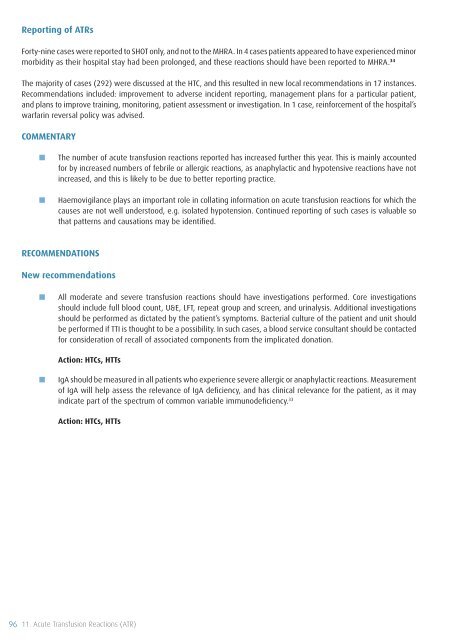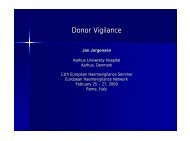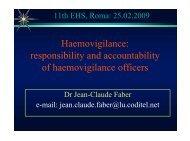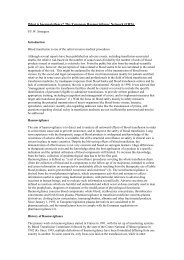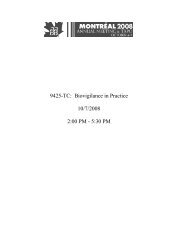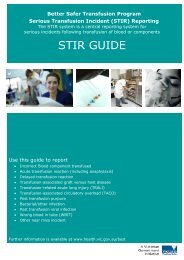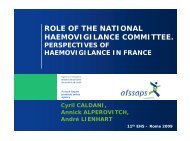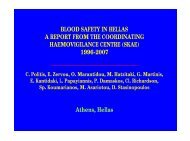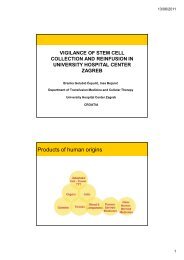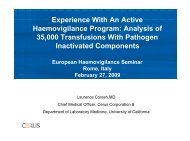SHOT Annual Report 2009 - Serious Hazards of Transfusion
SHOT Annual Report 2009 - Serious Hazards of Transfusion
SHOT Annual Report 2009 - Serious Hazards of Transfusion
Create successful ePaper yourself
Turn your PDF publications into a flip-book with our unique Google optimized e-Paper software.
<strong>Report</strong>ing <strong>of</strong> ATRs<br />
Forty-nine cases were reported to <strong>SHOT</strong> only, and not to the MHRA. In 4 cases patients appeared to have experienced minor<br />
morbidity as their hospital stay had been prolonged, and these reactions should have been reported to MHRA. 34<br />
The majority <strong>of</strong> cases (292) were discussed at the HTC, and this resulted in new local recommendations in 17 instances.<br />
Recommendations included: improvement to adverse incident reporting, management plans for a particular patient,<br />
and plans to improve training, monitoring, patient assessment or investigation. In 1 case, reinforcement <strong>of</strong> the hospital’s<br />
warfarin reversal policy was advised.<br />
COMMENTARY<br />
■■<br />
■■<br />
The number <strong>of</strong> acute transfusion reactions reported has increased further this year. This is mainly accounted<br />
for by increased numbers <strong>of</strong> febrile or allergic reactions, as anaphylactic and hypotensive reactions have not<br />
increased, and this is likely to be due to better reporting practice.<br />
Haemovigilance plays an important role in collating information on acute transfusion reactions for which the<br />
causes are not well understood, e.g. isolated hypotension. Continued reporting <strong>of</strong> such cases is valuable so<br />
that patterns and causations may be identified.<br />
RECOMMENDATIONS<br />
New recommendations<br />
■■<br />
All moderate and severe transfusion reactions should have investigations performed. Core investigations<br />
should include full blood count, U&E, LFT, repeat group and screen, and urinalysis. Additional investigations<br />
should be performed as dictated by the patient’s symptoms. Bacterial culture <strong>of</strong> the patient and unit should<br />
be performed if TTI is thought to be a possibility. In such cases, a blood service consultant should be contacted<br />
for consideration <strong>of</strong> recall <strong>of</strong> associated components from the implicated donation.<br />
Action: HTCs, HTTs<br />
■■<br />
IgA should be measured in all patients who experience severe allergic or anaphylactic reactions. Measurement<br />
<strong>of</strong> IgA will help assess the relevance <strong>of</strong> IgA deficiency, and has clinical relevance for the patient, as it may<br />
indicate part <strong>of</strong> the spectrum <strong>of</strong> common variable immunodeficiency. 33<br />
Action: HTCs, HTTs<br />
96 11. Acute <strong>Transfusion</strong> Reactions (ATR)


